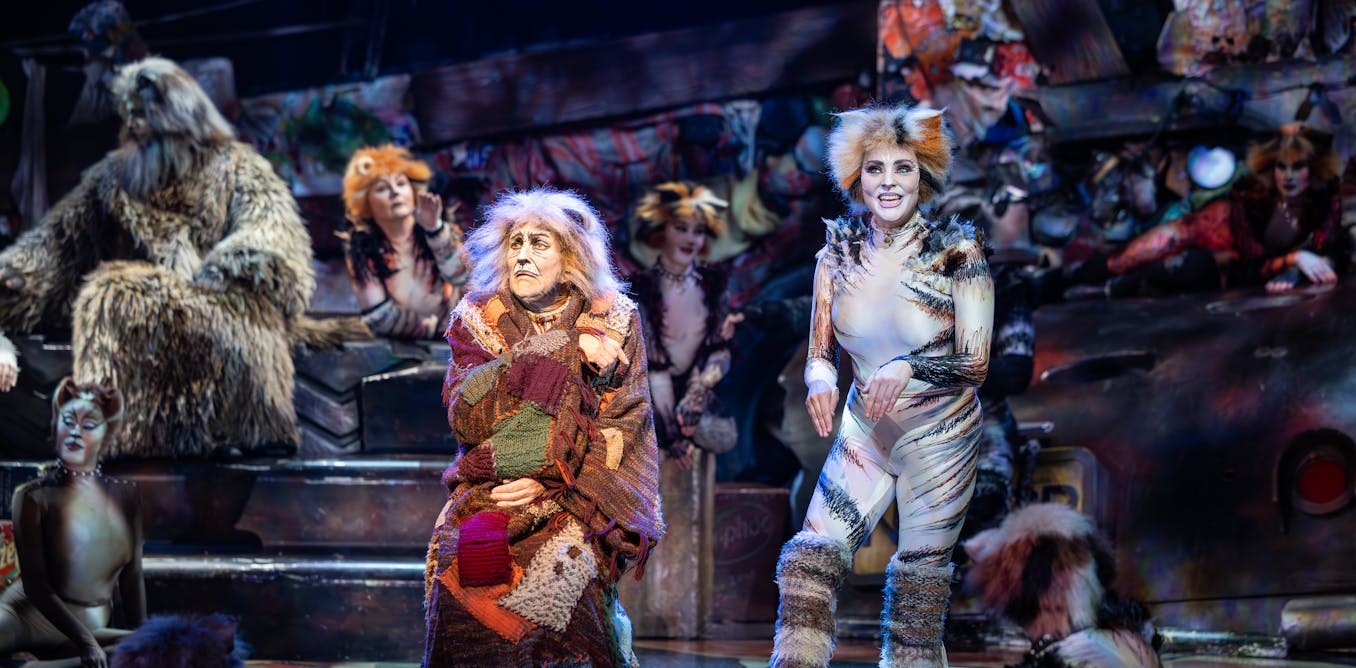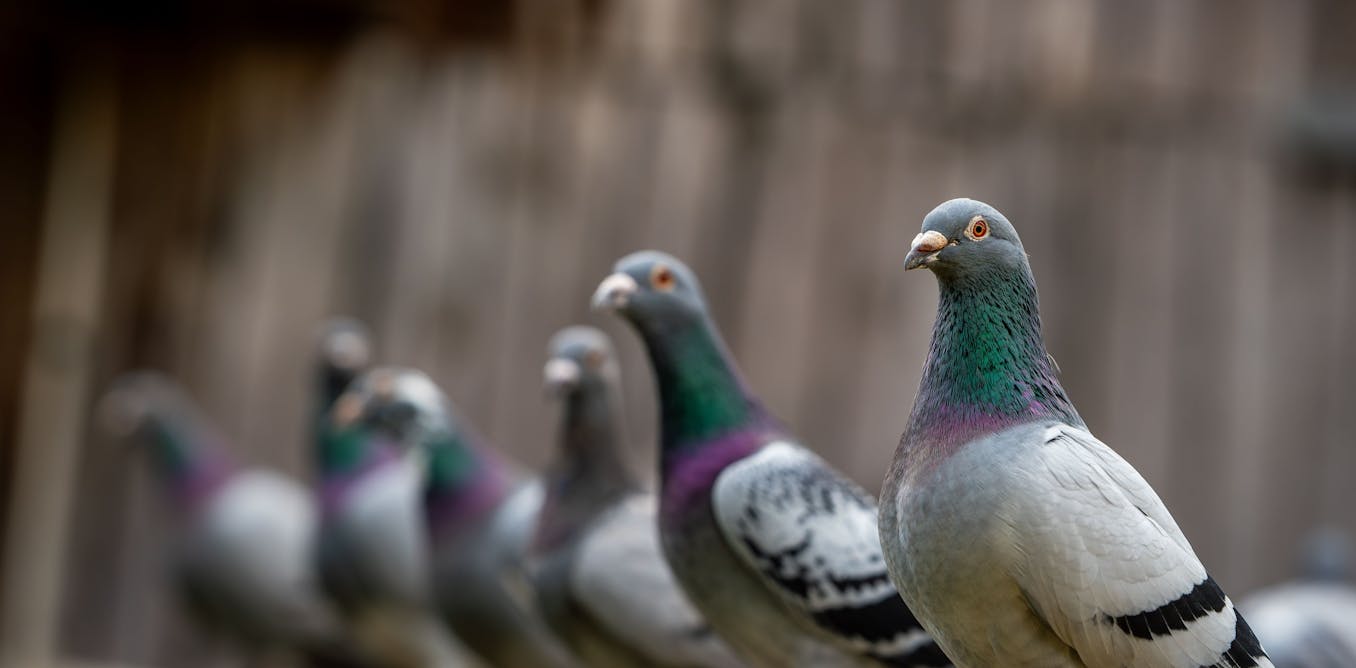The star of the 40th anniversary production of Cats – which premiered at the Theatre Royal Sydney last week – is the performing ensemble.
Some ensemble scenes, such as The Jellicle Ball, offered the same joy and exhilaration as the original 1985 production. In these moments of song and dance, the invisible connection between the performers’ hearts, voices and bodies, and those in the audience, is truly felt. There is still magic here.
Yet, 40 years on, it’s clear other aspects of the show have become too tired for modern audiences.
Comfort for frightening times
By today’s standards, Cats is a modest show where the biggest investment is in the extraordinary performers and performances.
But back in 1985, when it first premiered in Australia, Andrew Lloyd Webber’s musical was at the forefront of a wave of mega-musicals that swept the world. A review published in the Los Angeles Times that year called it “one of the most imaginative and eye-catching musicals of the century”.
Cats ran for decades, all around the world. On the West End it ran for 21 years and 8,949 performances. On Broadway, it replaced A Chorus Line as the longest-running musical, playing for 18 years.
First performed in London in 1981, the show is based on a set of poems from T.S. Eliot’s Old Possum’s Book of Practical Cats (1939). Some may know the poems from their primary school elocution classes (we both did).
Eliot wrote Old Possum’s Book of Practical Cats in the period between the two world wars, when the world was teetering on the edge of fascism. It spoke to an audience that was probably eager to escape from its frightening reality.
Commitment lifts the show
In the musical, the cats move between songs and ensembles that describe the characteristics of each individual. The musical styles include rock, classical, pop, jazz, musical hall, blues and everything in between. Each cat has a specific musical and movement language.
The committed and exuberant performers lift the show. Gabryel Thomas, who plays Grizabella, brings new life and intense musicality in her singing of the iconic song Memory.
Axel Alverez performs the role of Mr. Mistoffelees with exuberance and charisma. And Todd McKenney’s charming and nuanced characterisation of Bustopher Jones makes him an audience favourite.
The cameo roles feature strong performances by well-known music theatre performers, such as Lucy Maunder as Jellylorum, along with some newer faces, such as Claudia Hastings as White Cat.
Daniel Boud
Stagnation or reinvention?
In this re-launch, the score, direction and choreography are almost identical to what we saw back in 1985.
The dancing and choreography are the heart and soul of the show, just as they were back then. For those who appreciate performance, this alone will make Cats worth seeing.
Yet, the quality of the performances couldn’t completely make up for the tired and largely unchanged musical score. The 80s style synthesisers and guitars, and reduced orchestration, are oddly nostalgic, but in an unsatisfying way.
Nostalgia is big business, and no doubt this production taps into this. As music journalist Peter C Baker wrote in an article last year:
More and more of what we’re offered […] feels motivated by the logic that what people want, or can most easily be sold, is what they already liked before.
At the same time, there’s much discussion these days about reinterpretations of classic musicals and opera – which are often a gamble.
In the 2024 re-imagined New York production of Cats, Cats: The Jellicle Ball, the gamble paid off. The Jellicle Ball was set in a queer ballroom culture where competitive performers rehearse on a catwalk.
The show premiered to wide acclaim, with some reviewers saying Cats finally made sense. As reviewer Jeanine T. Abraham put it:
The ballroom version takes this story into the twenty-first century with flavor, sass, and reverence for the Black Queer Ballroom community who created this joyous form out of so much pain and trauma.
This positive reception was far removed from the very badly reviewed 2019 feature film starring James Corden.
Cats is a musical that has always been controversial – both celebrated and derided, depending on who you ask.
What makes a show spectacular?
Since around the mid 1980s, audiences have become acclimatised to the spectacular. Whether it’s Wicked, the Olympic ceremonies, or Kendrick Lamar’s Superbowl halftime show, we’ve come to expect spectacle and jaw-dropping visual effects. But Cats is not that kind of show.
Rather, it deals with the idea of community, and of a world where particular kinds of difference are accepted and others are rejected. The narcissistic elderly male cats are revered, while the glamour cat Grizabella is an outcast. A utopian ending brings reconciliation for all.
Cats is a musical that defied expectations. Many initially predicted it would flop, and the song Memory was the only real hit. Yet it enjoyed enormous success.
In 2025, the show leans heavily on its 30 or so performers who still manage to transport us to another world, despite the dated music and lack of story. The success of future interpretations will likely come down to how well those gaps can be filled.

The post “a dazzling cast – stuck in an outdated show” by Karen Cummings, Lecturer in Singing, University of Sydney was published on 06/27/2025 by theconversation.com



































Leave a Reply